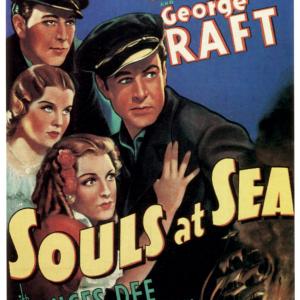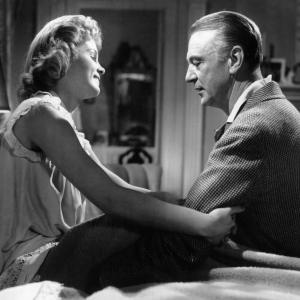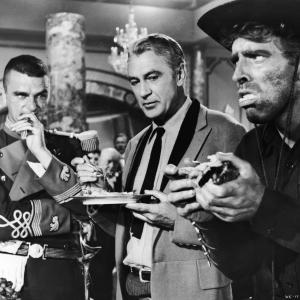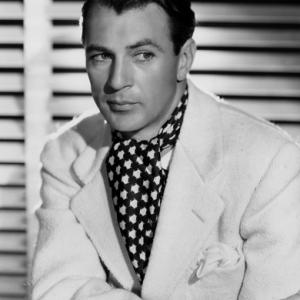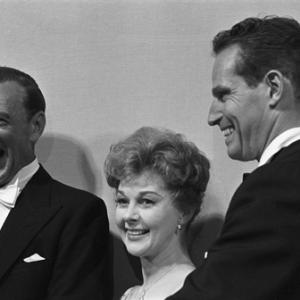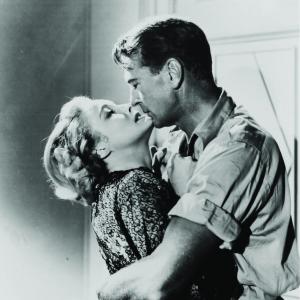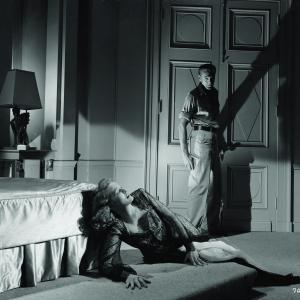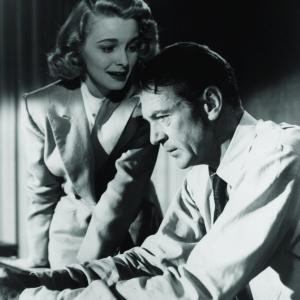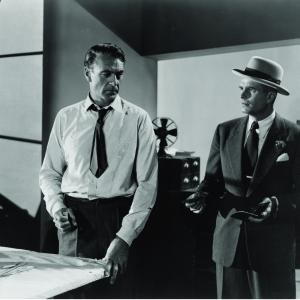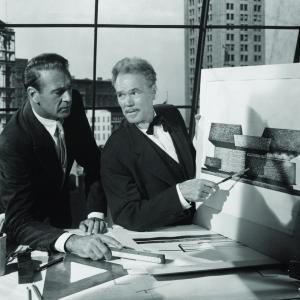| # | Fact |
|---|
| 1 | He never intended to become an actor and only began after meeting two friends from Montana when he first came to Los Angeles and, after working a series of odd jobs, was set up with a casting director who gave him work as an extra for five dollars a day and a rider for twice that amount. His intention was to save up enough for an Art course. |
| 2 | He was originally a painter and artist and had sought to pursue that as a career. His drawings and watercolors were exhibited throughout the dormitory in college, and he was named art editor for the college yearbook. In fact, he started work as an extra with the intention of making money to attend an art course. |
| 3 | Spent two years at the Dunstable Grammar School in Bedfordshire, England. |
| 4 | During the filming of 'Morocco (1930)', he was treated dismissively by director Josef von Sternberg. Tensions came to a head after von Sternberg yelled directions at Cooper in German. The 6"3-inch actor approached the 5"4 director, physically picked him up by the collar and said, "If you expect to work in this country you'd better get on to the language we use here. |
| 5 | He got the name 'Gary' from his agent Nan Collins who knew that there were other actors named Frank Cooper and got the name from her hometown of Gary, Indiana. |
| 6 | He was a lifelong heavy smoker. |
| 7 | The word "obey" was removed from the traditional marriage vow taken by he and wife Veronica in 1933. They reportedly had an "open marriage". |
| 8 | Was an acting mentor to Kirk Douglas. |
| 9 | He played several military characters from the World War I era. Ironically, this ranged from the real-life Alvin C. York, the most decorated U.S. soldier from the Great War, in Sergeant York (1941) to the fictional Maj. Thomas Thorne, a cavalry officer accused of cowardice under fire in They Came to Cordura (1959). |
| 10 | According to James Garner's autobiography Cooper developed the habit of paying for everything by check, knowing that people would keep it for his signature and never cash it (it was a trick also used by Pablo Picasso, who once said he had seldom paid for anything--from lunches to cars to houses--because of it. |
| 11 | In 1974, Cooper's body was removed from Holy Cross Cemetary and reburied under a three ton boulder at Sacred Heart Cemetery in Southampton, Long Island. His wife explained, " Gary loved Southapton. This is what he would want.". |
| 12 | In November 1955 Cooper was announced to star under the direction of Gerd Oswald in The Proud Ones (1956). Eventually the film was directed by Robert D. Webb with Robert Ryan in the leading role. |
| 13 | Often played the love interest of a significantly younger woman. A notable example is High Noon (1952) in which he and Grace Kelly played newlyweds. He was 51 and she was 22. |
| 14 | Pictured on a 44¢ USA commemorative postage stamp in the Legends of Hollywood series, issued 10 September 2009. |
| 15 | Born Frank Cooper, he changed his first name to Gary at the suggestion of his agent, Nan Collins, whose hometown was Gary, Indiana. |
| 16 | His father, an English immigrant to Montana who became a wealthy lawyer and rancher, was a judge on the Montana Supreme Court. |
| 17 | Although he was in failing health, his friend, director Henry Hathaway, had arranged to use him in his segments of How the West Was Won (1962). Upon his death, James Stewart, his best friend, accepted the role. |
| 18 | The revised 1946 lyric to Irving Berlin's song "Puttin' On the Ritz ("Dressed up like a million-dollar trooper/Trying hard to look like Gary Cooper/Super-duper")refers to Cooper in his early sound and pre-cowboy days when he was considered the height of tall, natural American elegance. This persona is best seen in Ernst Lubitsch's version of Noël Coward's play "Design for Living" (Design for Living (1933))where he is playing a character said to be inspired by Howard Hughes, whom Cooper very much resembled. |
| 19 | He is the step-uncle of Brooke Shields. Her grandfather is Cooper's wife's step-father, Paul Shields. |
| 20 | Three years after his death, his wife married Dr. John Converse. |
| 21 | He was in a car accident as a teenager that caused him to walk with a limp the rest of his life. |
| 22 | His daughter, Maria Veronica Balfe Cooper, was born on September 15, 1937. She now goes by her married name, Maria Cooper Janis. |
| 23 | Before his cancer was found to be terminal, he had intended to play James Stewart's role in How the West Was Won (1962). |
| 24 | Marlene Dietrich said about him: "Gary Cooper was neither intelligent nor cultured. Just like the other actors, he was chosen for his physique, which, after all, was more important than an active brain.". |
| 25 | Was the original visual basis for pulp hero Doc Savage. |
| 26 | In May 1931, after finishing I Take This Woman (1931), the combination of exhaustion, physical illness and the conflict between his possessive mother and jealous mistress led to a nervous breakdown. He had been working 14 to 16 hours a day, sometimes 23, making one film by day and another by night. He suffered from anemia and jaundice, and his weight dropped 30 pounds to a dangerously low 148 lbs. |
| 27 | He considered himself to be miscast in Peter Ibbetson (1935), The Adventures of Marco Polo (1938), Saratoga Trunk (1945) and Ten North Frederick (1958). |
| 28 | High Time (1960) was originally planned to be a vehicle for Cooper. |
| 29 | In May 1974 his body was removed from Holy Cross Cemetery in Los Angeles and reburied, under a three-ton boulder from a Montauk (NY) quarry, in Sacred Heart Cemetery in Southampton, New York, near his family. His wife explained, "Gary loved Southampton. This is what he would want". |
| 30 | His mother Alice Cooper died in a Palm Desert convalescent home on 6 October 1967, at the age of 94. His brother Arthur Cooper died in May 1982, at the age of 87. |
| 31 | Met Soviet premier Nikita Khrushchev at a luncheon organized by Charles Feldman at Twentieth Century-Fox on September 19, 1959. Khruschev personally invited Cooper and his wife and daughter on a six-day, United States Information Agency-sponsored trip to Moscow and Leningrad. After Cooper entertained some Soviet dignitaries at his house in Hollywood, ultra-conservative gossip columnist Hedda Hopper publicly denounced him as "soft on Commies". |
| 32 | He was originally supposed to play the leading role in Frank Capra's Mr. Smith Goes to Washington (1939), but Harry Cohn refused to loan Cooper out so James Stewart was cast instead. |
| 33 | He won an Oscar for playing Alvin C. York in Sergeant York (1941), making him one of 17 actors to win the Award for playing a real person who was still alive at the evening of the Award ceremony (as of 2015). The other sixteen actors and their respective performances are: Spencer Tracy for playing Father Edward Flanagan in Boys Town (1938), Patty Duke for playing Helen Keller in The Miracle Worker (1962), Jason Robards for playing Ben Bradlee in All the President's Men (1976), Robert De Niro for playing Jake La Motta in Raging Bull (1980), Sissy Spacek for playing Loretta Lynn in Coal Miner's Daughter (1980)_, Jeremy Irons for playing Claus Von Bullow in Reversal of Fortune (1990), Susan Sarandon for playing Sister Helen Prejean in Dead Man Walking (1995), Geoffrey Rush for playing David Helfgott in Shine (1996), Julia Roberts for playing Erin Brockovich in Erin Brockovich (2000), Jim Broadbent for playing John Bayley in Iris (2001), Helen Mirren for playing Queen Elizabeth II in The Queen (2006), Sandra Bullock for playing Leigh Anne Tuohy in The Blind Side (2009), Melissa Leo for playing Alice Eklund-Ward in The Fighter (2010), Christian Bale for playing Dickie Eklund in The Fighter (2010), Meryl Streep for playing Margaret Thatcher in The Iron Lady (2011) and most recently Eddie Redmayne for playing Stephen Hawking in The Theory of Everything (2014). |
| 34 | Turned down Joel McCrea's role in the Cecil B. DeMille epic Union Pacific (1939). |
| 35 | Writer Ayn Rand worked as an extra in Hollywood when she came to the U.S. from Russia, and she promptly became a fan of Cooper. When her novel "The Fountainhead" was made into a film, Rand was thrilled that Cooper was starring. Cooper's speech in a courtroom is one that Rand worked on for a very long time. When filming was over, Cooper admitted to her that he hadn't understood it. |
| 36 | Was considered for the role of Richard Sherman in The Seven Year Itch (1955). |
| 37 | After talking with Carl Foreman on the set of High Noon (1952), Cooper realized there had not been an attempt by Communists to infiltrate Hollywood, and later regretted his part in founding the right-wing Motion Picture Alliance for the Preservation of American Ideals. |
| 38 | In 1932 he was named as a supporter and benefactor of a right-wing organization known as the Hollywood Light Horse, which described itself as "a military organization formed to promote Americanism and combat Communism and radicalism subversive to Constitutional government", and which numbered English actor Victor McLaglen as one of its members. The assertion that Cooper was an active supporter was quickly withdrawn following protests by his representatives. |
| 39 | In 1925 he befriended another young, struggling, would-be actor named Walter Brennan. At one point they were even appearing as a team at casting offices, and although Cooper emerged in major and leading roles first, they would work together in the good years, too. Most memorably they starred in The Westerner (1940) together, where the general critical consensus was that Brennan's underplayed performance as Judge Roy Bean had stolen the film from Cooper. |
| 40 | In 1968 a "Variety" magazine poll of popular television personalities still included Cooper and his one-time rival Clark Gable, even though both actors had died nearly a decade earlier. |
| 41 | Lived with Anderson Lawler, a contract player at Paramount, in 1929. |
| 42 | Was considered for Robert Mitchum's role in The Night of the Hunter (1955). |
| 43 | Turned down James Mason's role as an aging movie star falling on hard times in A Star Is Born (1954). |
| 44 | He was a close friend of Bing Crosby, who named his eldest son after Cooper. |
| 45 | With the critical and commercial disaster You're in the Navy Now (1951), the word got out that Cooper was finished. He couldn't even sell a good picture that was a sure-fire formula to begin with--or once had been. He had disappeared completely from the Motion Picture Herald's annual survey of the top ten box office stars. He had been on the list for nine successive years, moving up and down but always there, proof that he was still a guarantee if only as a commodity star. Now he had lost even that. As the host of It's a Big Country: An American Anthology (1951), Cooper got fabulous press coverage during filming but after a few engagements it was withdrawn out of embarrassment. It wasted a warehouse of first-rate talent: Fredric March, William Powell, Gene Kelly, Ethel Barrymore, Janet Leigh, Van Johnson, Keenan Wynn and others. Cooper made another routine western, Distant Drums (1951), and then made the picture that would prove to be an enormous comeback vehicle for him: High Noon (1952). |
| 46 | Turned down Foreign Correspondent (1940) and Saboteur (1942). |
| 47 | He was a close friend and admirer of Pablo Picasso. |
| 48 | In 1960, for the first time since his arrival in Hollywood, there were no new Gary Cooper pictures. In the spring of that year he underwent several operations for prostate cancer, but in the autumn managed to film one final movie in England, The Naked Edge (1961). |
| 49 | An uncomfortable aspect of They Came to Cordura (1959) was that, besides looking far too old for his character, Cooper was looking quite ill and was actually filming against medical advice. Towards the end of the movie he was dragged 100 yards along the ground by a railroad handcar, something Stanley Kauffmann complained about in the "New Republic". |
| 50 | Ten North Frederick (1958) was originally intended as a Spencer Tracy vehicle, but Tracy withdrew due to poor health. |
| 51 | Although he had said previously that he would make no more biopics, he signed for The Court-Martial of Billy Mitchell (1955). It was a poor Otto Preminger film and even Billy Mitchell's widow expressed disappointment with Cooper's performance. Possibly the story had appealed to Cooper on political grounds and Mitchell may have been a hero of his--the general who accused the government of neglecting military needs. Cooper went on Ed Sullivan's TV show to promote the film and home viewers were quite disappointed--critic David Shipman referred to Cooper's "effeminate mannerisms in his TV interviews". |
| 52 | In 1951 he organized his own production company once more, calling it Baroda, and buying the film rights to Alfred Hayes' best-selling novel "The Girl on the Via Flaminia". He paid $40,000 for the rights and $10,000 to Hayes for a screenplay. He wanted to star in it with the young Montgomery Clift, the most popular young actor in Hollywood and also one of the best. Cooper could not arrange financing but broke even on his investment by selling the property to Leland Hayward and Anatole Litvak with the stipulation that Clift would have to star in it. The film was never made. Litvak, however, eventually made a film of The Chase (1966) much later, with Marlon Brando in the sheriff role that was being talked about in 1950 as Cooper's likely stage debut. John Hodiak took the role in Horton Foote's play when Cooper was unable to clear time with Warner Brothers--if indeed he tried. |
| 53 | His estate was valued at $9 million at the time of his death in 1961. |
| 54 | On January 8, 1961, he was given a testimonial dinner in Hollywood at the Friar's Club (it had nothing to do with his terminal cancer, which at the time his doctors didn't know he had). The aged Carl Sandburg was there, calling Cooper "a tradition while he's living, something of a clean sport, the lack of a phony." Audrey Hepburn read a poem called "What is a Gary Cooper?". Cooper didn't look well that night, but most observers thought he looked marvelous anyway. |
| 55 | Separated from his wife Rocky in May 1951, mainly over his affair with Patricia Neal. They did not live together again until July 1954. |
| 56 | On October 23, 1947, he appeared before the House Un-American Activities Committee in Washington, not under subpoena but responding to an invitation to give testimony on the alleged infiltration of Hollywood by communists. Other friendly witnesses appearing on the same day as Cooper were Robert Taylor, Robert Montgomery, George Murphy, Ronald Reagan and the aging Adolphe Menjou. Montgomery had long been active in Republican politics as a committeeman and later would serve as White House adviser during the Eisenhower administration. Murphy would serve as a Republican senator from California, with a very reactionary voting record. Reagan would become Governor of California and the national champion of extreme conservatism. Taylor, Menjou and Cooper would all retreat gradually from the political fracas, but only Cooper would make a show of repudiating what he had done. Although he never recanted his testimony or said he regretted having been a friendly witness, he became conciliatory during the subsequent period of the blacklist. As an independent producer, he hired blacklisted actors and technicians. He did say he had never wanted to see anyone lose the right to work, regardless of what he had done. After the release of High Noon (1952), an allegory for blacklisting, he stood by its screenwriter Carl Foreman despite pressure from rabidly right-wing gossip columnist Hedda Hopper. Immediately after the HUAC appearance, the films of Cooper, Taylor, Montgomery, Murphy, Reagan and Menjou were banned first in Hungary, then in Czechoslovakia and eventually in most of the Iron Curtain countries. So were those of Ginger Rogers and, curiously, tenor Allan Jones, seen usually in minor features and certainly no militant. On the witness stand Cooper had made light of the communists, the thrust of his testimony being that sure, they were in Hollywood just like everywhere else, but they were only a small faction giving the large patriotic body of the film community a bad name it didn't deserve. After his testimony Cooper received a standing ovation and vigorous applause. He later told Robert Taylor, "I got a much bigger hand than you did." Liberals, who never forgave the other friendly witnesses, generally made an exception for Cooper. |
| 57 | Although Cooper dismissed the new school of actors in the 1950s as "a bunch of goof balls" and could be caustic about "the Method" advanced by the Actors Studio in New York, Lee Strasberg told everyone that Cooper was a natural Method actor, he just didn't know it. Cooper did at least admire Marlon Brando's work, and became a producing partner with his father, Marlon Brando Sr.. |
| 58 | In 1958 Cooper had a private audience with Pope Pius XII at the Vatican, and in the following year became a convert to Roman Catholicism. |
| 59 | In 1938 Cooper took his wife on a junket to England and the Continent, and was the last American movie star to visit Nazi Germany prior to the outbreak of World War II. Until that point he had been basically apolitical and isolationist, opposed to President Woodrow Wilson's League of Nations. When the fateful Munich Conference immediately followed Cooper's return to America, he became increasingly active in the film community's pastime of playing national partisan politics. His allegiance to the right wing would be fairly consistent, though never a sure thing. He said he believed the US should become more involved diplomatically in world affairs but felt it was no business of Hollywood's. He said pointedly that MGM's cautiously anti-Nazi Three Comrades (1938) with its F. Scott Fitzgerald screenplay should not have been made, and that henceforth he would give more thoughtful attention to some of the film projects he was offered. |
| 60 | There has been much speculation over the years over whether Cooper's close friend Ernest Hemingway may have had latent homosexual tendencies. There is an easy agreement among Hemingway scholars that Papa, as he insisted Cooper should call him, was never actively homosexual, but the fact that he protested his masculinity so much in his novels and in real life has aroused suspicion. Hemingway's tendency to beautify in Cooper the qualities he found beastly in others is provocative. One Hemingway scholar maintained Papa was profoundly impressed that Cooper was such a stud. He said, "I believe that in his mind he loved Gary sexually, but I believe furthermore that Gary Cooper never once suspected it. If I am correct, that proves the beauty of Gary's naiveté, which Papa always found so charming." |
| 61 | He was very popular with audiences over a long period of time, his popularity exceeding that of "The King" Clark Gable himself at the box office. Named the #1 Box Office Star of 1953 in the Top 10 Poll of Money-Making Stars, as ranked by Quigley Publications' annual survey of movie exhibitors. He made the list 18 times from 1936 to 1957, which was a record when he died in 1961. Of his contemporaries, John Wayne (who accepted Cooper's 1952 Best Actor Oscar for High Noon (1952)) established the still-standing record of Box Office success with 25 appearances in the Top 10 between 1949 and 1974. |
| 62 | His lovers included Clara Bow, Evelyn Brent, Carole Lombard, Lupe Velez, Ingrid Bergman, Grace Kelly, Marlene Dietrich and Patricia Neal. Sir Cecil Beaton also claimed to have had an affair with him. |
| 63 | At first Cooper didn't want to make Friendly Persuasion (1956), not just because he felt the audience wouldn't accept him as a devout Quaker, but also because he did not want to play a father figure. This was despite the fact that he was now 55. On the set he arranged for his daughter Maria Cooper Janis to date Anthony Perkins, not seeming to realize that the young actor was gay. |
| 64 | In 1940, Cooper actively campaigned for Wendell Willkie as the Republican challenger to President Franklin D. Roosevelt's quest for a third term of office. Cooper believed Roosevelt was already too powerful, and would become more so. He told Cecelia Ager though that he advocated most of the New Deal reforms and believed the GOP made a mistake by not emphasizing their intention of retaining most of them. He said, "There's no going back to the ways of the Old Guard." Willkie, a well known womanizer, became firm friends with the actor. |
| 65 | In 1943 Cooper was one of the founding members of the right-wing Motion Picture Alliance for the Preservation of American Ideals, called merely "the Alliance" in the film community. Its other early leaders included Robert Taylor, Adolphe Menjou, Sam Wood, Norman Taurog, Clarence Brown, and Walt Disney. Clark Gable, thought of as one whose apolitical inclination was even more pronounced than Cooper's, was also a member. The Alliance's cheerleader was Lela E. Rogers, mother of Ginger Rogers. |
| 66 | During the 1944 presidential election the phrase, "I've been for Roosevelt before . . . but not this time!" was personally attributed to Cooper, forming the basis of full-page advertisements in major newspapers, paid for by the Republican National Committee. Cooper was extremely active on behalf of the Republican candidate, New York's governor Thomas E. Dewey. He gave speeches, did entertaining for fund raisers, met with Dewey in Los Angeles and did some personal campaigning in the film community. Whether Cooper had ever been "for Roosevelt before" is questionable. Possibly he voted for him in 1936 during the second-term landslide. If so, it was not publicly disclosed. Cooper's activities were as unpopular as Democrat Humphrey Bogart's endorsement of Franklin D. Roosevelt that year. The studio called in both stars and told them to stop antagonizing fans who did not share their political beliefs. |
| 67 | Often cited James Stewart as his closest friend. |
| 68 | In the late 1950s, his voracious eating habits finally caught up with him. After decades of incomparable thinness, Cooper put on 15 lbs, pushing his weight up to 190 lbs, which on his 6'3" frame was still slender. |
| 69 | He underwent four hernia operations between 1951 and 1953. |
| 70 | It was a testament to his durability that Charlton Heston, already a major star following The Ten Commandments (1956), was prepared to play a supporting role in The Wreck of the Mary Deare (1959). Heston was impressed that the veteran actor, 58 years old and in declining health, was still able to perform his own stunts, including being submerged underwater for long periods of time. In his book "The Actor's Life", Heston recalled he sensed early on it would be Cooper's picture but he didn't mind, because of all Cooper himself had meant to Heston, even as a child. |
| 71 | At the time of his terminal cancer being diagnosed towards the end of 1960, Cooper had signed to star in The Sundowners (1960) and Ride the High Country (1962). |
| 72 | Along with Sidney Poitier, he is the most represented actor on the American Film Institute's 100 Most Inspiring Movies of All Time, with five of his films on the list. They are: Mr. Deeds Goes to Town (1936) at #83, Sergeant York (1941) at #57, Meet John Doe (1941) at #49, High Noon (1952) at #27 and The Pride of the Yankees (1942) at #22. |
| 73 | The pallbearers at the funeral were Cooper's close friends - James Stewart, Henry Hathaway, Jack Benny, William Goetz, Jerry Wald, and Charles Feldman. Rocky and Maria walked behind the casket, alongside Cooper's 87-year-old mother Alice and his brother Arthur, as it was borne through the church to the hearse out on Santa Monica Boulevard. Among the top names of Hollywood attending the services were Norma Shearer, Dean Martin, Walter Pidgeon, Mary Pickford and Buddy Rogers, Marlene Dietrich, Randolph Scott, Joel McCrea, Frank Sinatra, Burt Lancaster, Jimmy Durante, Martha Hyer, John Wayne, Rosalind Russell, Robert Stack, Myrna Loy, Fay Wray, Joan Crawford, Maureen O'Sullivan, George Burns and Gracie Allen, Fred Astaire, Judy Garland, Bob Hope, Dinah Shore, and Karl Malden. Not one fan broke the lines to ask for an autograph. |
| 74 | After James Stewart revealed to the world that Cooper was dying of cancer, messages poured in from such friends and well-wishers as Pope John XXIII, former Vice President Richard Nixon, Henry Fonda, Pablo Picasso, Queen Elizabeth II of the United Kingdom, Princess Grace (Grace Kelly) of Monaco, John Wayne, Ernest Hemingway, former President Dwight D. Eisenhower, Bob Hope, Henry Hathaway, Audrey Hepburn, Mel Ferrer, William Goetz, Mary Livingstone (Mrs. Jack Benny) and Jack Benny, Gloria Stewart (Mrs. James Stewart) and James Stewart, Charles Feldman and Constance and Jerry Wald. The newly inaugurated President John F. Kennedy called from Washington and couldn't get through on the busy Cooper phone, but kept calling. He got through on the second day to talk to Gary for seven minutes. |
| 75 | His reputation as an unthinking conservative seems largely undeserved. Though he appeared as a "friendly witness" before the House Un-American Activities Committee (HUAC) in 1947, he carefully avoided naming any people he suspected of having Communist sympathies within the Hollywood community. He later starred in High Noon (1952), a western that was an allegory for blacklisting in Hollywood, and strongly defended blacklisted screenwriter Carl Foreman from attacks by the right-wing Motion Picture Alliance for the Preservation of American Ideals. Foreman later credited Cooper as the only major star in Hollywood who tried to help him. His mistress Patricia Neal, who did consider herself a liberal, said Gary was "conservative" but "you couldn't call him right-wing". Cooper showed a sense of humor by asking John Wayne to collect his Oscar for him in 1953, after Wayne had criticized High Noon (1952) as "anti-American". |
| 76 | In the spring of 1960 he had two operations, one for prostate cancer and another to remove a cancerous part of his colon. The doctors were sure that they had gotten all of it. His body strengthened and he made The Naked Edge (1961) in England, but during production he had a lot of pain in his neck and shoulders. When he returned home from England he went back to the doctor in February 1961 and it was then that he had to be told the cancer had metastasized to his lungs and bones. As he did in The Pride of the Yankees (1942) he took it in stride and said, "If it is God's will, that's all right, too." He opted not to take very much treatment. |
| 77 | His shot from High Noon (1952) was used as a Solidarity candidates trademark of the first independent elections in Poland in June 1989 ("There's a new sheriff in town") |
| 78 | On 16 April 1958 he entered the Manhattan Eye, Ear and Throat Hospital for a full face-lift and other cosmetic surgery by Dr John Converse, one of the leading plastic surgeons in America. Newspaper articles commenting on the effects of the operation said his face now looked quite different and the procedure had not been successful. |
| 79 | Both of his parents were immigrants to America from England. |
| 80 | He declined roles in The Big Trail (1930), Stagecoach (1939) and Red River (1948). All of these were subsequently played by John Wayne. |
| 81 | Was close friends with Ernest Hemingway for 20 years. Hemingway shot himself a month after Cooper's death. |
| 82 | He formed his own production company, Baroda Productions, in 1958. In 1959 the company made three of his more unusual films: The Hanging Tree (1959), They Came to Cordura (1959) and The Wreck of the Mary Deare (1959). |
| 83 | He left America and Hollywood and didn't return for 18 months. During that time he was in Hawaii, Mexico and France and shot four films: Return to Paradise (1953), Blowing Wild (1953), Garden of Evil (1954) and Vera Cruz (1954). |
| 84 | He wasn't present to receive his Academy Award in February 1953, for his portrayal of Marshal Will Kane in High Noon (1952). He asked John Wayne to accept it on his behalf. |
| 85 | He turned down both Stagecoach (1939) and Gone with the Wind (1939). |
| 86 | Took an acting class from Michael Chekhov |
| 87 | In 1951, after 25 years in show business, his professional reputation declined and he was dropped from the Motion Picture Herald's list of the top 10 Box Office performers. The following year he made a big comeback at the age of 51 with High Noon (1952). |
| 88 | Appeared in eight movies with Walter Brennan. These were Watch Your Wife (1926), The Wedding Night (1935), The Cowboy and the Lady (1938), The Westerner (1940), Meet John Doe (1941), Sergeant York (1941), The Pride of the Yankees (1942) and Task Force (1949). |
| 89 | Appeared in three movies with Barbara Stanwyck, Ball of Fire (1941), Meet John Doe (1941) and Blowing Wild (1953). |
| 90 | Howard Hawks directed him in three movies, Today We Live (1933), Ball of Fire (1941) and Sergeant York (1941). |
| 91 | Appeared in two movies with Marlene Dietrich, Morocco (1930) and Desire (1936). |
| 92 | Appeared in four movies with Fay Wray, The First Kiss (1928), The Legion of the Condemned (1928), The Texan (1930), One Sunday Afternoon (1933). |
| 93 | Frank Capra directed him in two movies, Mr. Deeds Goes to Town (1936) and Meet John Doe (1941). |
| 94 | Cecil B. DeMille directed him in The Plainsman (1936), North West Mounted Police (1940), The Story of Dr. Wassell (1944) and Unconquered (1947). |
| 95 | Sam Wood directed him in four movies, The Pride of the Yankees (1942), For Whom the Bell Tolls (1943), Casanova Brown (1944) and Saratoga Trunk (1945). |
| 96 | Starred in two movies with Teresa Wright, The Pride of the Yankees (1942) and Casanova Brown (1944). |
| 97 | His father Charles Cooper died of pneumonia on September 18, 1946, three months after Gary completed Cloak and Dagger (1946) and three days after his father's 81st birthday. |
| 98 | By 1942 he left Samuel Goldwyn and Paramount, then formed his own production company. On October 22, 1947, he signed with Warner Brothers to make films at $295,000 per picture. |
| 99 | By June 1955 he had made 80 films from which studios earned $250 million, but he only earned $6 million in salary and percentages. |
| 100 | He was a conservative Republican. He voted for Calvin Coolidge in 1924, and for Herbert Hoover in 1928 and 1932. He actively campaigned for Wendell Willkie in 1940, strongly believing that Franklin D. Roosevelt should serve no more than two terms of office, and endorsed Thomas E. Dewey in 1944. |
| 101 | In 1944 he formed his own production company, International Pictures, with Samuel Goldwyn. His partners were Leo Spitz, William Goetz (who'd recently been ousted from 20th Century-Fox) and Nunnally Johnson. They only produced nine movies, two of which starred Cooper, Casanova Brown (1944) and Along Came Jones (1945). Then in 1946 they sold International Pictures to Universal Pictures, which changed its name to Universal-International. |
| 102 | Has played six real-life characters on screen: Wild Bill Hickok, Marco Polo, Sgt. Alvin C. York, Lou Gehrig, Dr. Corydon M. Wassell and Gen. Billy Mitchell. |
| 103 | Appeared on the cover of Life magazine March 3, 1941. |
| 104 | He signed a six-year contract with Samuel Goldwyn Productions, to make six pictures at $150,000 per picture. At the time Paramount had legal rights to Cooper and threatened to sue. The two companies came to an understanding that Paramount would loan Cooper to Goldywn to make one picture a year from 1938-42. |
| 105 | He starred in two movies that were based on novels by Ernest Hemingway: A Farewell to Arms (1932) and For Whom the Bell Tolls (1943). |
| 106 | Named the #11 Greatest Actor on The 50 Greatest Screen Legends list by the American Film Institute |
| 107 | He blew the harmonica and strummed the guitar; played backgammon and bridge; grew corn and avocados on the Encino ranch he bought in the early 1930s and loved to work with his tractor in the garden. |
| 108 | His appetite was prodigious, but no matter how much he ate, he always remained thin. During his early years in Hollywood, working odd jobs and living with his parents, he said, he said with some comic exaggeration, that his "starvation diet at the time ran to no less than a dozen eggs a day, a couple of loaves of bread, a platter of bacon, and just enough pork chops between meals to keep me going until I got home for supper." His specialty on hunting trips was gargantuan: wild duck covered with bacon strips, enhanced by four eggs and steak. He could eat a cherry pie and drink a quart of milk for lunch. |
| 109 | His mother's favorite movie of his is The Pride of the Yankees (1942). |
| 110 | Has starred in a total number of 20 westerns, three of which were silent. |
| 111 | Appeared in 107 movies, 82 of which he starred in. Only 16 of those were filmed in color. And he starred in 14 silent movies. |
| 112 | He liked sports and kept in shape with hiking and riding, tennis and golf, archery and skiing, trout fishing and spear fishing, swimming and scuba diving and driving fast cars. He liked boxing. |
| 113 | He was fond of dogs, at various times he owned boxers, Dobermans and Great Danes. He and his wife also raised Sealyhams. |
| 114 | He was voted the 42nd Greatest Movie Star of all time by Premiere Magazine. |
| 115 | Is mentioned in the song "La Dernière Séance" by Eddy Mitchell. He is also mentioned in the song "Putting on the Ritz.". |
| 116 | He was voted the 18th Greatest Movie Star of all time by Entertainment Weekly. |
| 117 | His Oscar-winning roles as Will Kane from High Noon (1952) and Sgt. Alvin York from Sergeant York (1941) were ranked #5 and #35 in the American Film Institute's Heroes list in their 100 years of The Greatest Screen Heroes and Villains. |
| 118 | Despite his wholesome screen image, he was an infamous (and privately boastful) womanizer in reality, allegedly having had affairs with numerous and sometimes very famous leading ladies throughout his career. This was in spite of the fact that he had a faithful wife, Sandra, and that many of his lovers were also married. |
| 119 | Father of Maria Cooper Janis. |
| 120 | Upon seeing him, a professor in the theater department at Grinnell College recorded "shows no promise." |
| 121 | Pictured on one of four 25¢ US commemorative postage stamps issued 23 March 1990 honoring classic films released in 1939. The stamp featured Cooper as the title character of Beau Geste (1939). The other films honored were Stagecoach (1939), The Wizard of Oz (1939), and Gone with the Wind (1939). |
| 122 | Inducted into the Hall of Great Western Performers of the National Cowboy and Western Heritage Museum in 1966. |
| 123 | Father-in-law of pianist and composer Byron Janis. |
| 124 | Worked as a Yellowstone Park guide for several seasons before becoming an actor. |
| 125 | Along with Mylène Demongeot, Cooper set in motion the first escalator to be installed in a cinema, at the Rex Theatre in Paris on June 7 1957. |
| 126 | In the early 1930s his doctor told him he had been working too hard. Cooper went to Europe and stayed a lot longer than planned. When he returned, he was told there was now a "new" Gary Cooper--an unknown actor needed a better name for films, so the studio had reversed Gary Cooper's initials and created a name that sounded similar: Cary Grant. |
| 127 | Hobbies: Fishing, hunting, riding, swimming, and taxidermy. |
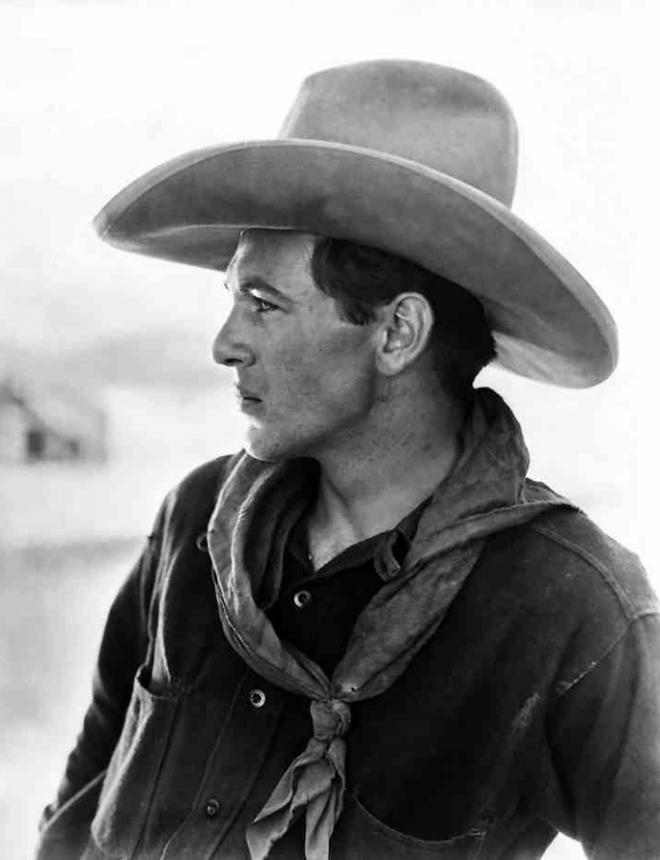
 $800,000
$800,000